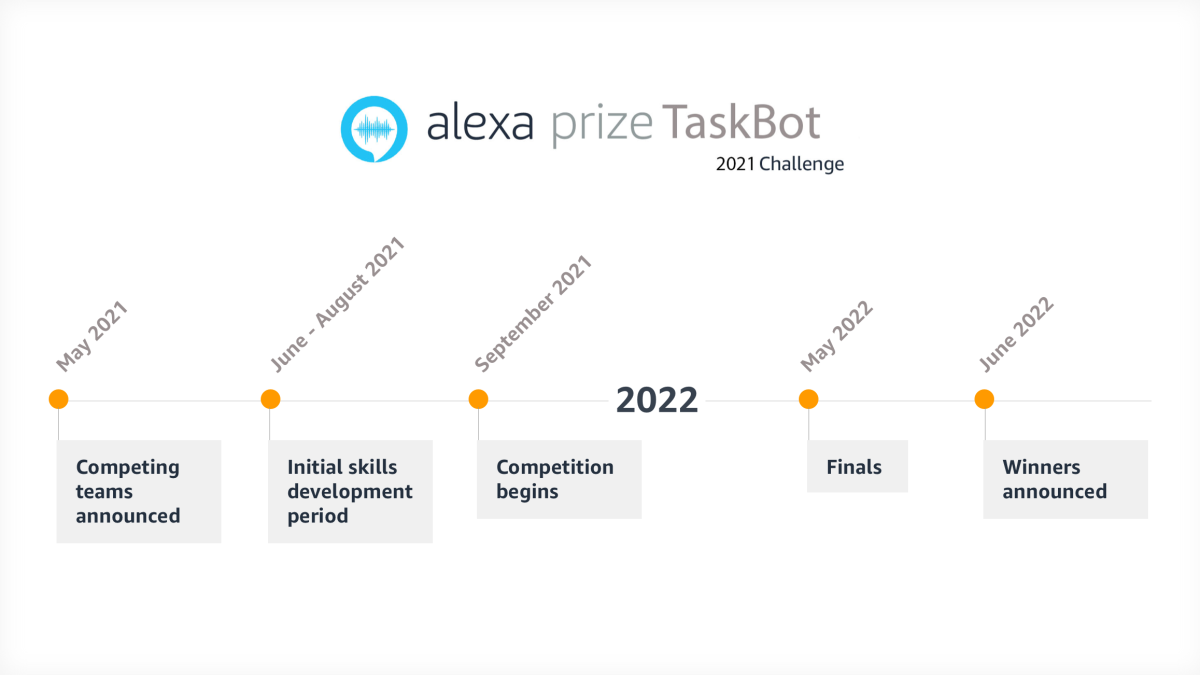Ten university teams, one from Asia, three from Europe and six from within the United States, have been selected to participate in the Alexa Prize TaskBot Challenge, the first conversational AI challenge to incorporate multimodal (voice and vision) customer experiences.
The teams will compete to develop agents that assist customers in completing cooking and do-it-yourself projects that require multiple steps and decisions. The year-long competition will conclude in May 2022, with winners being announced the following month.

“Alexa already assists millions of customers in goal-directed interactions, such as ‘Alexa, play ‘Your Power’ by Billie Eilish’, or ‘Alexa, what’s the weather forecast for the weekend? With this new Alexa Prize challenge, we are now turning to multi-step and multi-modal task completion that can span hours if not days,” said Yoelle Maarek, vice president of research and science, Alexa Shopping. “I am delighted to see that so many quality university teams have expressed interest in addressing this hard AI challenge. This is a wonderful example of our customer-obsessed science approach where we join forces with academia to push the boundaries of science with the goal of delighting our customers.”
Success in the challenge will require the teams to address many difficult AI challenges, from knowledge representation and inference, and commonsense and causal reasoning, to language understanding and generation, requiring fusion of multiple AI techniques.
The ten teams selected to compete are:
- Carnegie Mellon University
- National Taiwan University (NTU)
- NOVA School of Science and Technology (Portugal)
- Ohio State University
- Texas A&M University
- University College London
- University of California Santa Barbara
- University of Glasgow
- University of Massachusetts (Amherst)
- University of Pennsylvania
Each team will receive a $250,000 research grant, Alexa-enabled devices, free Amazon Web Services (AWS) cloud computing services to support their research and development efforts, access to the TaskBot Toolkit, other data resources, and Alexa team support.
The additional data sources the teams will be able to utilize in developing their agents include datasets from Whole Foods Market and wikiHow. These data sources will be readily available to teams via APIs, streamlining development efforts, and allowing the teams to deliver quality customer experiences.
“Whole Foods Market is the destination for high quality, healthy food options, and we are thrilled to be a part of the Alexa Prize challenge this year,” said Sonya Gafsi Oblisk, Whole Foods Market chief marketing and communications officer. “We recognize cooking can be hard and time consuming for many reasons, especially if you are new to cooking or following a special diet. We can’t wait to see how these students will innovate to make it more convenient for families to cook delicious, healthy home-cooked meals.”

"wikiHow is very excited to partner with Amazon for the Alexa Prize TaskBot Challenge,” said Elizabeth Douglas, CEO of wikiHow. “We are delighted to contribute our DIY content to this challenge, because the goal aligns so closely with our mission of teaching everyone in the world how to do anything. We can't wait to see how the teams leverage our trusted step-by-step instructions to help customers successfully finish their tasks. Congratulations to the teams selected, and best of luck! We look forward to seeing the innovative ways that the Amazon Alexa TaskBot Challenge will help even more people learn how to do things."
The winning team will receive a $500,000 prize, and second- and third-place teams will receive $100,000 and $50,000, respectively.
More information about the challenge is available on the TaskBot Challenge frequently asked questions page. Customers can look forward to interacting with the TaskBots starting in October 2021.
Alexa Prize Socialbot Grand Challenge
The TaskBot Challenge is occurring in parallel with the SocialBot Grand Challenge 4 in which university teams are competing to create socialbots that can converse coherently and engagingly with humans for 20 minutes on a range of topics, from entertainment and sports, to politics and fashion.
Earlier this month, eight teams were selected to advance to the semifinal round of the competition, based upon customer satisfaction scores. The eight teams still competing are:
- Czech Technical University, Prague
- Emory University
- Moscow Institute of Physics & Technology
- SUNY at Buffalo, New York
- Stanford University
- Universidad Politécnica de Madrid
- University of California, Santa Cruz
- University of Southern California
The finals for that competition will occur in July, with winners announced in August. Similar to the TaskBot Challenge, the winning team will earn a $500,000 prize, with second- and third-place teams receiving $100,000 and $50,000, respectively.
The grand challenge, a $1 million research grant, will be award to the winning team’s university if it attains a composite score of 4.0 or higher on a 5-point scale, and at least two-thirds of the socialbot’s conversations with interactors last for 20 minutes.
Customers can engage with the teams’ socialbots simply by saying, “Alexa, let’s chat”.



















